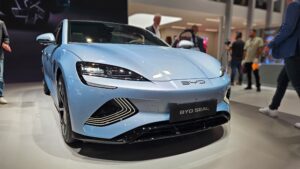The White House announced that the Commerce Department will solicit input from the automotive industry and the general public regarding the nature of risks associated with, and potential measures to mitigate, the use of technology in vehicles originating from China and other “countries of concern,” including Russia and Iran.
“We’re doing it now, before Chinese manufactured vehicles become widespread in the United States and potentially threaten our privacy and our national security,” remarked Raimondo.
This investigation marks the inaugural step by the Commerce Department’s Bureau of Industry and Security in response to executive orders issued by Biden aimed at protecting domestic information and communication technology from national security threats.
According to the White House, electric vehicles and other automobiles increasingly depend on advanced technologies for navigation, driver assistance, and carbon emission reduction. However, these vehicles continually interact with personal devices, other vehicles, U.S. infrastructure, and their manufacturers, thereby posing national security risks.
The White House highlighted the potential for new vulnerabilities and threats to emerge with connected vehicles if foreign governments gain access to their systems or data.
While the Trump administration’s imposition of high tariffs, which the Biden administration has maintained, has dissuaded Chinese automakers from entering the U.S. market, concerns persist that Chinese companies may absorb additional costs as China intensifies its focus on exports. Chinese automakers are also expanding their presence overseas, with EV giant BYD announcing plans for its first European plant last year.
Ford CEO Jim Farley expressed concerns about competing with Chinese automakers in the EV sector, noting their rapid increase in market share in Europe over the past two years.
John Bozzella, president of the Alliance for Automotive Innovation, representing major automakers, warned that proposed U.S. environmental regulations could inadvertently bolster China’s position in America’s electric vehicle battery supply chain and automotive market.
In response to rising imports from China, the European Union launched a trade investigation last year into Chinese subsidies for electric vehicles, an inquiry that remains ongoing.

